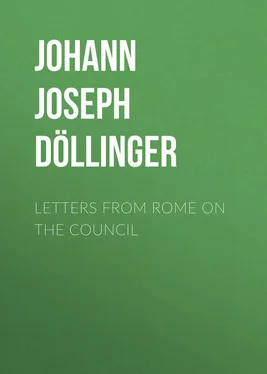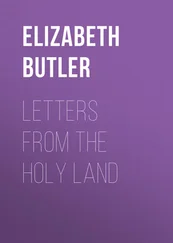Johann Döllinger - Letters From Rome on the Council
Здесь есть возможность читать онлайн «Johann Döllinger - Letters From Rome on the Council» — ознакомительный отрывок электронной книги совершенно бесплатно, а после прочтения отрывка купить полную версию. В некоторых случаях можно слушать аудио, скачать через торрент в формате fb2 и присутствует краткое содержание. Жанр: foreign_antique, foreign_prose, на английском языке. Описание произведения, (предисловие) а так же отзывы посетителей доступны на портале библиотеки ЛибКат.
- Название:Letters From Rome on the Council
- Автор:
- Жанр:
- Год:неизвестен
- ISBN:нет данных
- Рейтинг книги:3 / 5. Голосов: 1
-
Избранное:Добавить в избранное
- Отзывы:
-
Ваша оценка:
- 60
- 1
- 2
- 3
- 4
- 5
Letters From Rome on the Council: краткое содержание, описание и аннотация
Предлагаем к чтению аннотацию, описание, краткое содержание или предисловие (зависит от того, что написал сам автор книги «Letters From Rome on the Council»). Если вы не нашли необходимую информацию о книге — напишите в комментариях, мы постараемся отыскать её.
Letters From Rome on the Council — читать онлайн ознакомительный отрывок
Ниже представлен текст книги, разбитый по страницам. Система сохранения места последней прочитанной страницы, позволяет с удобством читать онлайн бесплатно книгу «Letters From Rome on the Council», без необходимости каждый раз заново искать на чём Вы остановились. Поставьте закладку, и сможете в любой момент перейти на страницу, на которой закончили чтение.
Интервал:
Закладка:
Meanwhile there are growing signs that at least a portion of the French episcopate are not willing to degrade themselves to the humiliating rôle of mere acclaimers to the propositions of the Curia . In two articles of the Français (for March 18 and 19) Dupanloup has already decisively disclaimed sympathy with the tendencies and insinuations loudly expressed in the notorious correspondence of the Civiltà . He gives a specimen of the hopes and wishes about the Council intimated by the French Bishops in their pastorals, where he shows that they are all far from expecting it to assail political and social liberty and freedom of conscience, to condemn modern civilisation and widen the breach between the Catholic Church and other Christian bodies, by proclaiming new dogmas; but, on the contrary, that they look for a reformation of Church discipline adapted to the age, and a work of general reconciliation with the great ideas of cultivation, freedom, and the common weal. These declarations of the French episcopate excited great surprise and deep disgust at Rome, without, however, to all appearance, having disturbed the Curia in their plans, as they know from the statistics that they can count on an imposing majority in the Council.
Seats are prepared for 850 Bishops at the Council, but the question whether Bishops in partibus are to have decisive votes is not yet decided. Since, however, their admission will not materially affect the relative position of the two parties, they may be left out of the account. To these voting members of the Council must be added 57 Cardinals, and the number might be raised before its opening to 72, by the bestowal of the 15 hats vacant at present. There are thus about 920 decisive votes, including 40 Italian Cardinals, 294 Italian Bishops, 66 Spanish, 22 Portuguese, 90 French, – in all 512 prelates of the Romance race in Europe, to whom must be added 77 Brazilian, Mexican, and South American Bishops, raising the whole Romance representation to 600 votes. From this number about 60 must be deducted for vacant Italian Sees, and some 140 who may presumably be unable to attend. And so about 400 are left, whose votes, with the exception of a number of French Bishops, are counted upon by the Curia . The Court also reckons on the votes of 48 from England and Ireland, 52 from North America, 20 from Greece and Turkey, 6 from Belgium, 5 from Holland, and 16 from Canada. If the Polish and Russian Bishops are allowed to come, they too will swell the majority; and so, it is believed, will the Armenian and Uniate Bishops in Austria, Russia, and Bulgaria, numbering about 40. Of the 65 German and Austrian Bishops scarcely half will side with the Opposition. And so, if matters are to be settled by majorities, the Curia is fully assured of its victory. Cardinal Antonelli counts on from 500 to 600 votes of those actually present.
Under these circumstances the Governments of countries with Catholic populations should be urgently pressed to devote their serious attention to what is already going on in Rome, and not to let themselves be taken by surprise by the decrees of the Council, which, when once promulgated, will place their subjects in a painful dilemma between their duties towards the State and their obedience to the Church; will everywhere create disquiet and conflicts; and must, above all, involve their Bishops in contradictions with the Constitutions they have sworn to observe. In the present difficulties of the general political and social situation in Europe, a conflict in the highest degree fatal might ensue with the Church, whose mission of culture is not yet diminished even for the time, and whose co-operation for its own purposes the State cannot dispense with. In this contest the Church cannot conquer, because the spirit of the age is against her; but the very crash of so mighty an edifice would cover and destroy with its ruins the institutions of the State itself, perplex consciences, and entail universal mischief by for the first time fully confirming the spirit of absolute negation of the ethical and ideal conception of life. The proceedings of Prince Hohenlohe may have sprung from this statesmanlike consideration; they are inspired by a friendly spirit towards the Church herself, and are of a thoroughly loyal character. He wishes the Governments openly to communicate with their Bishops, in order to point out to them the deplorable consequences which must follow from so premeditated and systematic a revolution of the existing relations between Church and State, and also, while there is still time, to take precautions against the event of conciliar decrees encroaching on the political domain. He challenges the learned corporations of the State most directly competent, to give their opinion publicly as to the practical results involved in making the Syllabus and Papal Infallibility into dogmas. This proceeding is far from being premature, for it is the business of a statesman not only to legislate in view of accomplished facts, but to provide for menacing dangers, nor will his conduct be blamed by any true friend of Church and State, whose faculty of judgment is not utterly blinded by hatred. The repressive measures which Governments would be compelled to employ after the promulgation of the contemplated dogmas would not be at all in the interest of the Church. Suppose, for instance, freedom of conscience, already condemned in the Syllabus, were anathematized by the Council, and the doctrine of religious compulsion sanctioned, the Bavarian Bishops who had assented to this decree, or wished to obey it, would have broken their oath to the Constitution, the Constitution which guarantees freedom of conscience would be under the ban of Rome, and the Government would have to answer by publishing the Concordat.
The Council. (Allg. Zeit., Aug. 19, 1869.)
If the present situation in regard to the Council is considered, the triumph of the Jesuit ultramontane party there appears highly probable. The demonstration of the Rhenish Catholics has as yet assumed no larger dimensions, and will evidently gain nothing by the projected Catholic meeting at Düsseldorf; for not only is red-hot ultramontanism a decisive obstacle, but the widely growing and deepening religious indifference hinders men from taking any part in movements based on a spirit of loyalty to the Church. In Rome, accordingly, little notice is taken of the movement, and satisfaction is felt at the prospect of expelling this mischievous liberal element from the Church, because then it is hoped the kernel which remains true may be more boldly dealt with. Our German ultramontane press, which lost no time in making a bitter and contemptuous attack on the address of the Rhenish Catholics, is therein only the exponent of the mind of the Curia . Meanwhile the German Bishops are preparing themselves to commit an act of doctrinal and ecclesiastical suicide, by renouncing for ever their long obscured but not as yet surrendered rank and authority as supreme judges of faith. 6 6 These fears, as is well known, were not realized at Fulda.
Two of them, Bishops Ketteler of Mayence and Fessler of St. Pölten, have already pronounced in separate works for the infallibility of the Pope.
The diplomatic action of Prince Hohenlohe in regard to the Council has indeed created for the time a sensation, which still continues among the States interested in the matter, and which eventually culminated in the desire to obtain further information about the propositions to be submitted for the acceptance of the assembled Bishops, but even the representative of France has been baffled by the arts of the Curia . When, in June, M. Banneville put the decisive question whether they were not prepared to deny the alarming rumours as to the propositions to be laid before the Council, and to take immediate steps for facilitating the representation of Catholic States in the Council through ambassadors of their own, Antonelli replied that he had no knowledge of what was going on in the Commissions, but as to the second point, the Church in her present changed relations with Catholic States, which sometimes persecute her and sometimes put her on an equality with other religious bodies, could not take the initiative. M. Banneville, who had simply spoken of the presence of an ambassador at the Council, but had said nothing of his rights, stated that this conversation had “profoundly humiliated him.” Thenceforth the Court of Rome was the more confirmed in its resolve to keep out diplomatists from the Council. To an indirect question as to the admission of an ambassador from non-Catholic States, which have a large Catholic population, an instant negative was returned. The quarrel of the Austrian Government with the Bishop of Linz has given a further impulse in the same direction, for then Antonelli began to declare more openly that it was indeed possible, but not likely, that any ambassadors would be admitted, till now at last he makes no secret of its being out of the question for Rome, under existing circumstances, to think of allowing Governments to be represented. It would not be feasible, he opines, to admit France alone, and what other Catholic States are there that have not already disqualified themselves for taking part in the Council? Thus by degrees France too is gently thrust aside with her inquiries and demands, and the only question is whether Napoleon's Government will be content with this. Unless the clerical party in France itself causes the Emperor to assume an attitude of opposition to the Jesuit ultramontane programme of the Council, there is not much to be expected from him, since in view of the internal difficulties his Government at present has to contend with, he is obliged to take that party into account as an important factor in his calculations.
Читать дальшеИнтервал:
Закладка:
Похожие книги на «Letters From Rome on the Council»
Представляем Вашему вниманию похожие книги на «Letters From Rome on the Council» списком для выбора. Мы отобрали схожую по названию и смыслу литературу в надежде предоставить читателям больше вариантов отыскать новые, интересные, ещё непрочитанные произведения.
Обсуждение, отзывы о книге «Letters From Rome on the Council» и просто собственные мнения читателей. Оставьте ваши комментарии, напишите, что Вы думаете о произведении, его смысле или главных героях. Укажите что конкретно понравилось, а что нет, и почему Вы так считаете.












